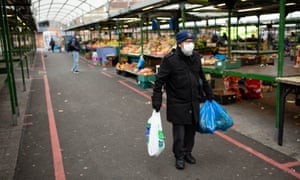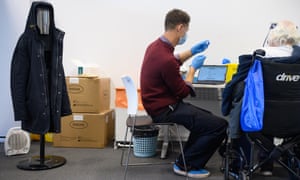
A leading GP said doctors need certainty of vaccine supply to be able to hit Boris Johnson’s target of 2m inoculations a week to cover the four highest priority groups by the middle of February.
David Wrigley, who runs a practice with 25,000 patients in Carnforth, north Lancashire, began vaccinating patients today but said that while he had enough supply of the Pfizer and AstraZeneca vaccines to last into next week, “after that I’ve not got a clue on what is coming”.
The doctor, who is also a vice chair of the British Medical Association, said that “he wanted to be positive about this” but uncertainty about supply meant it was not possible to arrange appointments for jabs the week after next until the next batch arrived.
“This is where pressure needs to be exerted on the politicians,” the doctor said. “We know what’s coming next week but if we could have two to three weeks advance notice then we can plan properly. At the moment we are staring into the unknown.”
The arrival of the more portable AstraZeneca vaccine will allow Wrigley’s practice to vaccinate all 300 patients who live in care homes on its books over the weekend and with the Pfizer inoculation it will be possible to give jabs to another 1,050 patients aged over 80 – a high proportion of those in the first two priority groups for the practice.
Updated
at 11.40am EST
Daily reported deaths at new high as 1,325 people die within 28 days of Covid diagnosis
Updated
at 11.51am EST
More than 300,000 people a week will need to be vaccinated against Covid-19 in the West Midlands if the region’s 1.6 million most vulnerable people are to receive jabs by the middle of February.
The figure was confirmed by Sally Roberts, the chief nursing officer for the Black Country and West Birmingham clinical commissioning group, who is leading the vaccine rollout in that part of the Midlands.
Roberts told a press briefing on Friday that “tens of thousands” of people in the region had been inoculated against Covid-19 since the first vaccines were given on 8 December, nearly five weeks ago.
Liam Byrne, the Labour MP for Birmingham Hodge Hill, has urged the West Midlands mayor, Andy Street, to launch a vaccine taskforce to accelerate the distribution of jabs.
Byrne said on Friday that at the current pace it would take until 27 April to vaccinate all high-priority residents in the West Midlands and until 14 July to vaccinate the 2 million people over the age of 50.
Roberts said there had been “logistical challenges” to the introduction of the vaccine but these had been “resolved and mitigated quite quickly”.
The region is to move on 25 January to a scheme whereby GPs can order a specific amount of vaccine doses for a particular day. Under a current “top-down” policy, GP surgeries are told when they will receive more supplies.

Updated
at 11.26am EST
Scientists warn over public relaxing guard amid vaccine roll-out
Scientists have expressed concern that one of the “unintended consequences” of the vaccine’s introduction could be less adherence to protective rules and regulations, newly released documents from the government’s Sage advisory panel show.
Modelling suggests that depending on “real-world” effectiveness of the vaccines, reduced adherence could “more than offset” the benefits of vaccination by increasing infection rates, particularly in the early months before there is a high degree of coverage.
A UK national survey in early December suggested that once they believed they had acquired some level of immunity, a “significant minority” intended to reduce adherence to rules such as hand and surface hygiene, use of tissues, face protection, social distancing and room ventilation.
The survey found while 50% would still follow rules, another 29% said they would do so less strictly, with those aged 18-24 most likely to say this, while 11% said they would probably no longer follow the rules.
A UK poll conducted after the vaccine rollout had begun showed that 66% believed people should still be subject to restrictions after they received the vaccine, but 22% said they believed those vaccinated should not be subject to any more restrictions.
Scientists recommended a “culturally tailored” communications strategy was needed to emphasise that such restrictions were still “vital” . It recommended monitoring adherence to rules, and developing a system of rapid alerts to allow “timely intervention” if adherence starts to fall. It was important to ensure that communications promoting vaccination did not undermine communication promoting adherence to rules, it said.

Updated
at 10.37am EST





